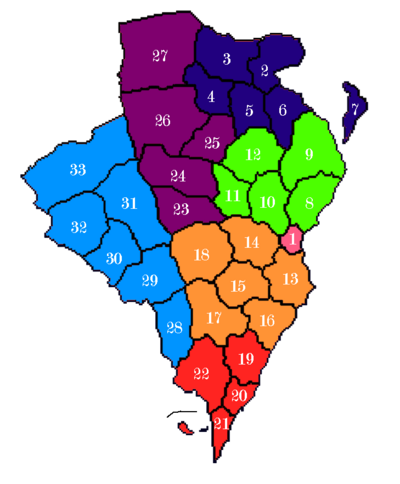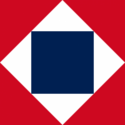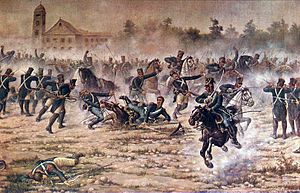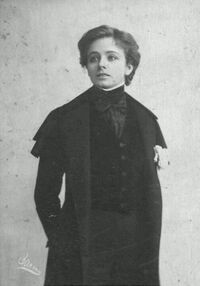Bercadie: Difference between revisions
No edit summary |
|||
| (4 intermediate revisions by the same user not shown) | |||
| Line 6: | Line 6: | ||
|native_name = République Bercadienne | |native_name = République Bercadienne | ||
|common_name = Bercadie | |common_name = Bercadie | ||
|status = | |status = | ||
|image_flag = Bercadie flag.png | |image_flag = Bercadie flag.png | ||
|image_coat = | |image_coat = | ||
| Line 21: | Line 21: | ||
|national_languages = Common | |national_languages = Common | ||
|religion = [[Church of the Sun and Moon]] | |regional_languages = Japuilean<br>Talan | ||
|ethnic_groups = | |religion = Accord Ancienne<br>Illian Church of the Sun and Moon<br>[[Church of the Sun and Moon]] | ||
|ethnic_groups = {{unbulleted list|item_style=white-space:nowrap; | |||
|{{Tree list}} | |||
*83.3% Métis | |||
** 74.2% Noir | |||
** 25.8% Blanc | |||
{{Tree list/end}} | |||
|<br>8,7% Talan<br>4.8% Japuilean<br>3.2% Other}} | |||
|demonym = Bercadian | |demonym = Bercadian | ||
|government_type = Unitary Semi-Presidential Republic | |government_type = Unitary Semi-Presidential Republic | ||
| Line 33: | Line 40: | ||
|lower_house = National Assembly | |lower_house = National Assembly | ||
|sovereignty_type = Establishment | |sovereignty_type = Establishment | ||
|established_event1 = | |established_event1 = Proclamation of the Bercadian Republic | ||
|established_date1 = | |established_date1 = 1384 | ||
|established_event2= | |established_event2= | ||
|established_date2 = | |established_date2 = | ||
| Line 70: | Line 77: | ||
'''Bercadie''', officially the '''Bercadian Republic''' is a country in southern [[Ilus]]. It borders [[Nova Solarius]] to the north-west and shares maritime borders to [[Mushakan]] in the west and [[Azureria]] to the south. It is bordered by the [[Magna Sea]] to the west and the [[Great Ocean]] to the east. | '''Bercadie''', officially the '''Bercadian Republic''' is a country in southern [[Ilus]]. It borders [[Nova Solarius]] to the north-west and shares maritime borders to [[Mushakan]] in the west and [[Azureria]] to the south. It is bordered by the [[Magna Sea]] to the west and the [[Great Ocean]] to the east. | ||
Following the Great Restart, the region was home to many diverse tribes. Explorers from [[Japuile]] under the leadership of [[Emeran Perrot]] arrived around 500AR and established the Ilian Kingdom which would grow over the following centuries to eventually dominate the entire peninsula. | Following the Great Restart, the region was home to many diverse tribes. Explorers from [[Japuile]] under the leadership of [[Emeran Perrot]] arrived around 500AR and established the Ilian Kingdom which would grow over the following centuries to eventually dominate the entire peninsula. The revolution of 1384 overthrew the Perrot dynasty and established the Bercadian Republic. Though repeatedly threatened by internal conflicts during the early tumultuous years, the republic prevailed. | ||
The revolution of | |||
| Line 84: | Line 89: | ||
== Ilian kingdom == | == Ilian kingdom == | ||
== Revolutionary Era ( | == Revolutionary Era (1380-1395 AR) == | ||
The last years of the Perrot dynasty was marked by crisis. The royal inquisition began operating with increasing intensity, trying to hunt down practitioners of unsanctioned faiths throughout the realm. Rather than pacify this sparked a number of large revolts and the kingdom would find itself in a constant war against heathen communities operating from the dense jungles and the remote highlands. The mounting costs and heavy tax burden to pay for them created tension in the cities. | The last years of the Perrot dynasty was marked by crisis. The royal inquisition began operating with increasing intensity, trying to hunt down practitioners of unsanctioned faiths throughout the realm. Rather than pacify this sparked a number of large revolts and the kingdom would find itself in a constant war against heathen communities operating from the dense jungles and the remote highlands. The mounting costs and heavy tax burden to pay for them created tension in the cities. | ||
[[File:San Lorenzo.jpg|300px|thumb|left|Battle of Mierve (1385)]] | |||
Mondechau was becoming a hotbed of revolutionary sentiments, with large numbers of political clubs and secret societies operating and publishing inflammatory newspapers despite the crowns every attempt to shut them down. In 1384 [[Charles III of Bercadie|King Charles]], fearing the mobs, hastily fled to the royalist stronghold Iloupol. The royal palaces in Mondechau were seized by the citizens and a congress was held where after some discussion the Bercadian Republic was proclaimed. The royalist forces saw initial success against the revolutionary armies hastily raised by the provisional government in Mondechau but the offensive was halted at the decisive battle of Mierve. Meanwhile rebels in the north under the leadership of [[la Pucelle de Luçéans]] seized the royal fleet at anchor in [[Luçéans]]. The war came to an end in Primo 1389 with the [[Sige of Iloupol|surrender of king Charles in Iloupol.]] The king along with many of his chief supporters among the aristocracy were tried and executed. | |||
= Geography and Climate = | |||
= Culture = | |||
Bercadie has a diverse and vibrant culture which has been influenced by their Japuilean heritage, the native pre-colonial culture and by the high culture of [[Nova Solarius]]. | |||
=== Literature === | |||
During the Ilean kingdom literature was exalted as an art form, with many works of the genre known as *courtly love* being produced and spread in the many different dialects of Bercadian. | |||
=== Cinema === | |||
[[File:Georges Faure.jpg|200px|thumb|right|alt=Black and white picture of the Bercadian writer and directer Georges Faure, in a suit.|Director and writer Georges Faure.]] | |||
The film industry of Bercadie grew from its rich tradition of theatre. Among the most celebrated writers and directors, and who exemplifies the heightened realism movement (*le réalisme accru*) was the trans man Georges Faure (1491-1576) who mixed grounded realistic depictions of the Mondéen city life he knew mixed with heavy fantastical elements, often drawing from indigenous mythology. In *Aimé par la Nuit* (1538) he tells the story of a woman cursed with eternal life maintained by feeding on the living and attempting to find love, community in her struggle to maintain her wavering humanity and choosing finally to abandon it to preserve her existence, killing all who she had held dear. | |||
The large film industry centered in Iloupol is contrasted with the largely indie, independent film scene of [[Médine (Bercadie)|Médine]], the products of which are highlighted and celebrated at a number of film festivals throughout the republic. | |||
=== Music === | |||
Since the beginning of the 16th century Mondechau has been known for its jazz scene, which grew out from the combining influences of local music styles with the military bands. Beginning as entertainment at night clubs in *la Cellier* Mondéen Jazz grew into many subgenres and became a mainstay of public festivals and even of the traditional jazz funerals. | |||
In contrast the strong working-class character of Médine saw the growth the rock an later punk scene which was characterized by strong anti-authoritarian and often overtly socialist or anarchist themes. | |||
= Government and Politics = | = Government and Politics = | ||
Latest revision as of 19:59, 1 August 2024
Bercadian Republic République Bercadienne | |
|---|---|
|
Flag | |
| Motto: "Liberté, égalité, fraternité" (Bercadian) "Liberty, equality, fraternity" (Common) | |
| Capital | Mondechau |
| Official languages | Bercadian |
| Recognised national languages | Common |
| Recognised regional languages | Japuilean Talan |
| Ethnic groups |
|
| Religion | Accord Ancienne Illian Church of the Sun and Moon Church of the Sun and Moon |
| Demonym(s) | Bercadian |
| Government | Unitary Semi-Presidential Republic |
• President | Gustave Lasalle |
• Prime Minister | Aristides Etariki |
| Legislature | Congress |
| Council of the Republic | |
| National Assembly | |
| Establishment | |
• Proclamation of the Bercadian Republic | 1384 |
| Population | |
• Census | 33,200,000 |
| GDP (nominal) | estimate |
• Total | $1,272,888,000,000 |
• Per capita | $38,340 |
| Currency | Bercadien Écu (B$) (BRE) |
| Date format | dd/mm/yyyy |
| Driving side | right |
Bercadie, officially the Bercadian Republic is a country in southern Ilus. It borders Nova Solarius to the north-west and shares maritime borders to Mushakan in the west and Azureria to the south. It is bordered by the Magna Sea to the west and the Great Ocean to the east.
Following the Great Restart, the region was home to many diverse tribes. Explorers from Japuile under the leadership of Emeran Perrot arrived around 500AR and established the Ilian Kingdom which would grow over the following centuries to eventually dominate the entire peninsula. The revolution of 1384 overthrew the Perrot dynasty and established the Bercadian Republic. Though repeatedly threatened by internal conflicts during the early tumultuous years, the republic prevailed.
Etymology
Bercadie is derived from the name Bella Arcadia (Beautiful Arcadia) given to the domain of the Ilian kingdom. The origins of the name Arcadia are unknown, predating the Great Restart.
History
Early Post-Restart
Ilian kingdom
Revolutionary Era (1380-1395 AR)
The last years of the Perrot dynasty was marked by crisis. The royal inquisition began operating with increasing intensity, trying to hunt down practitioners of unsanctioned faiths throughout the realm. Rather than pacify this sparked a number of large revolts and the kingdom would find itself in a constant war against heathen communities operating from the dense jungles and the remote highlands. The mounting costs and heavy tax burden to pay for them created tension in the cities.
Mondechau was becoming a hotbed of revolutionary sentiments, with large numbers of political clubs and secret societies operating and publishing inflammatory newspapers despite the crowns every attempt to shut them down. In 1384 King Charles, fearing the mobs, hastily fled to the royalist stronghold Iloupol. The royal palaces in Mondechau were seized by the citizens and a congress was held where after some discussion the Bercadian Republic was proclaimed. The royalist forces saw initial success against the revolutionary armies hastily raised by the provisional government in Mondechau but the offensive was halted at the decisive battle of Mierve. Meanwhile rebels in the north under the leadership of la Pucelle de Luçéans seized the royal fleet at anchor in Luçéans. The war came to an end in Primo 1389 with the surrender of king Charles in Iloupol. The king along with many of his chief supporters among the aristocracy were tried and executed.
Geography and Climate
Culture
Bercadie has a diverse and vibrant culture which has been influenced by their Japuilean heritage, the native pre-colonial culture and by the high culture of Nova Solarius.
Literature
During the Ilean kingdom literature was exalted as an art form, with many works of the genre known as *courtly love* being produced and spread in the many different dialects of Bercadian.
Cinema
The film industry of Bercadie grew from its rich tradition of theatre. Among the most celebrated writers and directors, and who exemplifies the heightened realism movement (*le réalisme accru*) was the trans man Georges Faure (1491-1576) who mixed grounded realistic depictions of the Mondéen city life he knew mixed with heavy fantastical elements, often drawing from indigenous mythology. In *Aimé par la Nuit* (1538) he tells the story of a woman cursed with eternal life maintained by feeding on the living and attempting to find love, community in her struggle to maintain her wavering humanity and choosing finally to abandon it to preserve her existence, killing all who she had held dear.
The large film industry centered in Iloupol is contrasted with the largely indie, independent film scene of Médine, the products of which are highlighted and celebrated at a number of film festivals throughout the republic.
Music
Since the beginning of the 16th century Mondechau has been known for its jazz scene, which grew out from the combining influences of local music styles with the military bands. Beginning as entertainment at night clubs in *la Cellier* Mondéen Jazz grew into many subgenres and became a mainstay of public festivals and even of the traditional jazz funerals.
In contrast the strong working-class character of Médine saw the growth the rock an later punk scene which was characterized by strong anti-authoritarian and often overtly socialist or anarchist themes.
Government and Politics
Bercadie is a representative democracy organized as a unitary, semi-presidential republic.
The executive branch has two leaders. The President of the Republic, currently Gustave Lasalle, is the head of state, elected directly by universal adult suffrage for a five-year term.The Prime Minister, currently Aristides Atariki, is the head of government, appointed by the President to lead the government. As the Assembly has the power to remove the government through a vote of no-confidence the Prime Minister must in practice be the leader of the largest coalition in the Assembly. The President has the power to dissolve Parliament or circumvent it by submitting referendums directly to the people; the President also appoints judges and civil servants, negotiates and ratifies international agreements, as well as serves as commander-in-chief of the Armed Forces. The Prime Minister determines public policy and oversees the civil service, with an emphasis on domestic matters.
The legislative branch consists of the bicameral Congress of the Republic, made up of the lower house,the National Assembly (Assemblée nationale) and the upper house, the Council of the Republic (Conseil de la République). Legislators in the National Assembly, known as deputies, represent local constituencies and are directly elected for five-year terms. The Assembly has the power to dismiss the government by majority vote. Legislators of the Council of the Republic, known as councilors, are chosen by an electoral college for six-year terms, with half the seats submitted to election every three years. The Councils legislative powers are limited; in the event of disagreement between the two chambers, the National Assembly has the final say. The congress is responsible for determining the rules and principles concerning most areas of law, political amnesty, and fiscal policy; however, the government may draft specific details concerning most laws.
Until the early 16th century politics were dominated by rural conservative parties, foremost of which were PEC (Le Parti de l'état cordial). With the industrialization and urbanization of the nation the growing middle and working classes began pressuring for political reforms and the expansion of the franchise. Universal suffrage for all men was confirmed in 1503 and for women in 1534.
For most of the 16th century Bercadien politics were divided between the socialist left, represented by the Socialist Party of Bercadie (PSB, Parti socialiste Bercadienne), and the liberals, represented by the Nationalist Liberal Party (PNL, Parti Nationaliste Libéral) and the Radicals (Rad, Parti Radical).
Administrative divisions
Bercadie is divided in seven regions, which are further subdivided into 33 departments.
| Region | Map of the Bercadian Administrative Regions and Departments | |||
|---|---|---|---|---|
| Mondechay | Sud de Iliou | 
| ||
| 1 | Mondechau | 19 | Illiou | |
| Grand-nord | 20 | Domasye | ||
| 2 | Corveau | 21 | Cap Arcadie | |
| 3 | Apartade | 22 | Selenne | |
| 4 | Caulise | Aviers | ||
| 5 | Osolie | 23 | Ville-Soleil | |
| 6 | Kay Havre | 24 | Donechas | |
| 7 | Cap Soleil | 25 | Virias | |
| L'Argent | 26 | Montchaque | ||
| 8 | Platain | 27 | Reyner | |
| 9 | Cartagene | Talan | ||
| 10 | Sen Dolor | 28 | Kirian | |
| 11 | Magangue | 29 | Corailesse | |
| 12 | Luçe | 30 | Assante | |
| Nord de Iliou | 31 | Raimonte | ||
| 13 | La Salle | 32 | Evanchol | |
| 14 | Mievre | 33 | Kay Heyan | |
| 15 | Bellsan | |||
| 16 | Caredain | |||
| 17 | Bolivere | |||
| 18 | Sen Malin | |||


